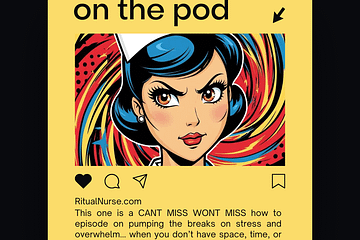Mastering the Art of Effective Work Life Management
As nurses, we often pour so much of our energy into caring for others that we forget to care for ourselves. The rigorous demands of our profession, coupled with the emotional toll of patient care, can leave us feeling worn down, stressed, and, if we’re not careful, burned out. But it doesn’t have to be this way. Nurses deserve to thrive—not just survive—in their careers, and that starts with prioritizing mental health, fostering work-life balance, enhancing professional skill sets, and embarking on personal healing journeys.
The conversation I recently came across in “Candid Career Talk: A Personal Chat with Ginny Clarke” struck a chord with me, not only as a nursing executive but also as someone deeply committed to helping other healthcare professionals lead fulfilling, healthy lives. Ginny Clarke’s insights illuminate the power of intentional living and the importance of aligning personal values with professional goals. You can read the original source of her wisdom [here](https://www.candidcareertalk.com). While Clarke doesn’t specifically address nursing, her advice can easily be adapted to suit the unique challenges of the healthcare field—and nurses in particular.
Recognizing the Importance of Mental Health in Nursing
The path to thriving in our careers starts with acknowledging the high stakes of mental health in nursing. The field demands empathy, focus, and resilience in the face of relentless stressors like long shifts, emotionally charged situations, and even exposure to trauma. A 2021 study in the Journal of Nursing Management found that burnout among nurses continues to rise, driven by systemic pressures and the lingering effects of pandemic-era challenges.
But acknowledging a problem is only the first step. Nurses should feel empowered to seek resources that enhance emotional well-being. Whether this means accessing your workplace’s Employee Assistance Program (EAP), connecting with a therapist who understands the healthcare landscape, or taking advantage of digital apps like Calm or Headspace to manage stress, we must shed the stigma around mental health care.
My takeaway from Ginny Clarke’s message is that self-care isn’t selfish—it’s the foundation of everything else. Nurses who prioritize their mental health are not only better positioned to provide high-quality patient care; they’re also better collaborators, leaders, and contributors to the workplace. Mental health is not a luxury; it’s a necessity.
The Balancing Act: Work-life Synergy, Not Separation
While the phrase “work-life balance” is often thrown around in self-help and professional development spaces, Ginny Clarke prefers to frame it as work-life integration or synergy. Her perspective challenges the outdated notion of completely separating work from personal life—a feat that feels nearly impossible for nurses whose roles demand both professional and emotional labor.
Instead of rigid compartmentalization, Clarke emphasizes the importance of honoring our multifaceted identities. For nurses, this might mean building schedules and routines around deeply held values. Are you passionate about family time? If so, consider negotiating flexible work arrangements or identifying opportunities for shorter shifts. Do you feel most energized when pursuing creative hobbies? Schedule intentional downtime for those passions alongside your professional responsibilities.
The key here is to stop seeing work and life as competitors. They’re partners. And by identifying how each aspect of your life can complement and enhance the other, you can find a rhythm that works for you. Nursing should not come at the expense of your personal relationships, passions, or inner peace. Instead, let your nursing career be part of a larger, purpose-driven life.
Excelling in Professional Skill Development
Thriving in nursing doesn’t solely revolve around mental health and personal well-being; it also means feeling confident in your professional abilities and empowered in your career growth. Clarke emphasizes the value of lifelong learning, a notion that resonates deeply with the evolving nature of healthcare. As the medical field continues to grow, nurses face ongoing challenges in staying current with best practices, emerging technologies, and evidence-based interventions.
Seek out continuing education opportunities through trusted organizations like the American Nurses Association (ANA). Programs like nurse residency initiatives, certificate courses, and online modules can help you stay at the top of your game while also keeping you engaged and motivated.
Additionally, don’t underestimate the importance of networking. Ginny Clarke talks about the vital role of relationships in career progression, and for nurses, this means connecting with colleagues who inspire and challenge you. From joining nursing associations to attending conferences, professional relationships can provide mentorship opportunities, innovative insights, and even pathways to leadership. Remember, professional growth is not always linear—it’s often about the relationships and values you cultivate along the way.
Empowering the Personal Healing Journey
Healing, both emotional and physical, is often a subject nurses address with patients, yet struggle to apply to themselves. Clarke speaks about the importance of pausing to reflect on past experiences, identifying what isn’t serving you, and taking the necessary steps to realign your life. For nurses, this personal healing journey can take many forms.
Mindfulness practices, journaling, or working with a coach or mentor can help you unpack the emotional weight of past challenges—whether that means navigating patient loss, workplace conflict, or personal struggles exacerbated by the demands of your role. Healing isn’t a destination; it’s an ongoing process. It requires space, grace, and a commitment to understanding your limits.
Physical self-care is equally important. As healthcare providers, we educate patients on exercise, sleep hygiene, and nutrition, yet often neglect these essentials in our own lives. Something as simple as consistent hydration and meal prepping (to avoid shifts fueled by vending machine snacks) can go a long way toward physical and emotional rejuvenation. Remember, healing doesn’t have to be elaborate. Nourish your body and mind in ways that feel sustainable and enjoyable.
Breaking Free from Perfectionism
One of the most striking takeaways from Ginny Clarke’s career talk is her perspective on perfectionism. Many nurses, myself included, are hardwired to achieve, excel, and perform at 110%—every day, every shift. However, this constant striving for perfection often leaves little space for self-compassion.
Clarke insists that the pursuit of perfection often does more harm than good, urging us instead to strive for excellence while granting ourselves grace. Nurses must learn to embrace imperfection as part of the human experience, practicing humility in their professional roles. Mistakes and challenges don’t detract from your worth; they shape your growth as a clinician and a person.
Letting go of perfectionism also invites opportunities for creativity in problem-solving. When we stop clinging to the narrow definition of what’s “perfect,” we open ourselves up to innovation and resilience. This mindset shift can transform how you approach everything from patient care to personal self-care.
Cultivating a Sense of Purpose
Finally, thriving as a nurse means staying connected to your “why.” What initially drew you to nursing? Was it the opportunity to help others, solve complex medical puzzles, or contribute to meaningful health outcomes? Revisiting and realigning yourself with this sense of purpose can reignite the spark that sustains your professional journey.
Ginny Clarke talks about the transformative power of intentionality—being deliberate about where you invest your time, energy, and alignment. For nurses, this could mean assessing your current position and determining whether it honors your personal and professional values. If it doesn’t, don’t be afraid to explore new roles or specializations within healthcare. Sometimes, empowerment comes from stepping outside your comfort zone and pursuing a path that truly resonates with your goals and passions.
Final Notes
Being a nurse is both a privilege and a responsibility, and it’s no small feat to navigate the complexities of this demanding yet deeply fulfilling profession. But thriving must be the goal. By prioritizing mental health, embracing work-life integration, honing professional skills, empowering personal healing, and rediscovering your purpose, you position yourself to not only stay in the fight but discover joy and fulfillment in the process.
Ginny Clarke’s wisdom serves as an excellent roadmap for achieving this balance, even as we tailor it to the unique challenges of the nursing landscape. You can reference her insights and learn more from her personal reflections [here](https://www.candidcareertalk.com). Remember: caring for yourself isn’t selfish—it’s a gift to your patients, your peers, and your profession. By modeling resilience and well-being, you can become an even more powerful agent of healing for all those you serve.



